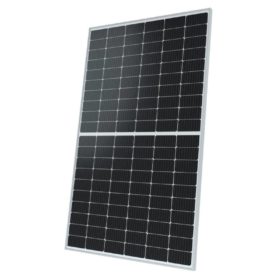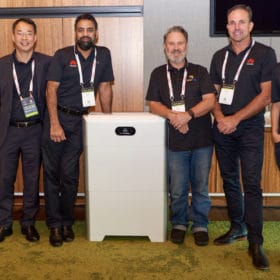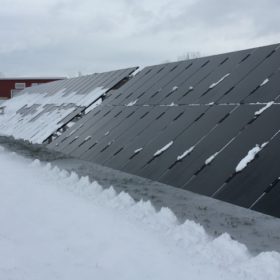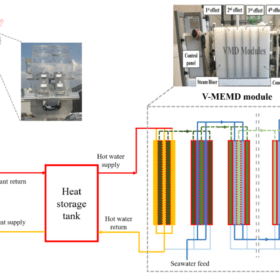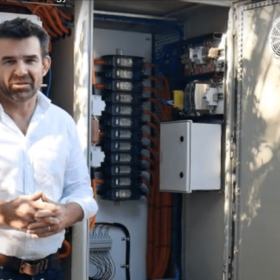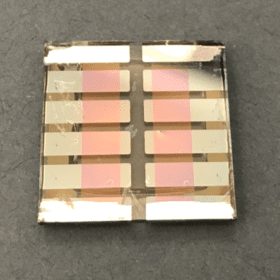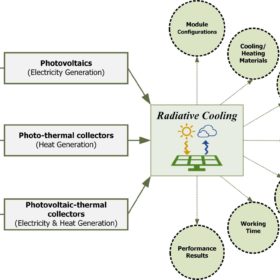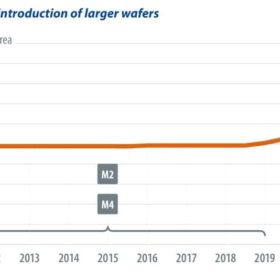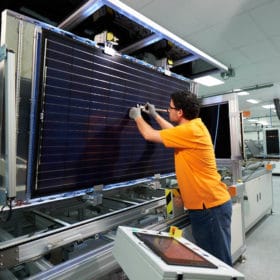Q Cells announces n-type module with passivating contacts
Production on the new module, called Q.Tron, is expected to begin this year. The product is described as an evolution of the company’s Q.antum cell technology.
Solarwatt unveils two bifacial glass-glass panels with half-cell design
The most powerful of the two products has a power output of up to 380 W and an efficiency of 20.4%. For both panels, the temperature coefficient is -0.37%. The German manufacturer said the modules are produced at its manufacturing facility in Dresden.
Huawei enters Australia’s residential battery market with modular Luna2000
Chinese giant Huawei has entered Australia’s residential solar battery market with its home energy storage system, the Luna2000. The lithium-iron phosphate 5kWh cells have a modular design and are scalable to 30kWh. Huawei is banking on 10 kWh system capacities being most popular, telling pv magazine Australia they will retail for under AU$10,000.
Going fission! How scientific enquiry by UNSW may push solar cell efficiency to 38.2%
Cross-pollination of scientific and engineering thought within the ARC Centre of Excellence for Exciton Science has led to promising findings on the the cool solar-cell efficiency-boosting mechanism known as singlet fission.
Rooftop CPV-thermal tech to produce electricity and freshwater
It’s claimed the decentralised desalination system can deliver a levelised cost for desalinated water of US$0.7-4.3/m3, depending on PV costs and electricity prices. It was built with several concentrated photovoltaic/thermal (CPV-T) collectors, a hot water tank, a V-MEMD module, a seawater feed tank, and a distillate tank.
Redflow launches itself into high-voltage grid-scale space with Energy Pod Z modules
Queensland flow battery company, Redflow, has unveiled the product it’s hoping will launch its lucrative high-voltage, high-capacity, grid-scale future: the Energy Pod Z module.
Organic solar for high-speed data detection and indoor light harvesting
Researchers in the United Kingdom have built a 14%-efficient organic PV device that can be used in high-speed optical wireless communication systems. The cell consists of a 4×2.5mm photoactive layer fabricated with a bulk heterojunction of a polymer donor and fullerene and non-fullerene acceptors.
The best radiative cooling tech for PV arrays
Scientists in China have analysed the radiative cooling techniques used in combination with solar energy systems such as PV arrays, solar thermal collectors, and concentrated PV installations. They identified five major system typologies based on functionality and working time.
Sunday read: Too big to handle
There has been a flurry of activity within the PV cell manufacturer landscape over the past 12 to 18 months, and it’s largely been in one direction: bigger. But as large-format modules arrive on the market, questions are being raised as to how long the trend can continue and when bigger becomes, quite simply, too big.
Australian manufacturer unveils new 400W module as demand grows
Australia’s only solar module manufacturer Tindo Solar has unveiled a new generation 400 W module for the domestic and export markets as the Adelaide-based company rides a wave of success that has delivered a 40% increase in retail orders and 70% rise in wholesale orders in the past 12 months.

